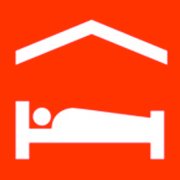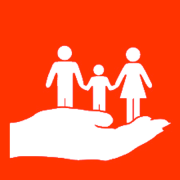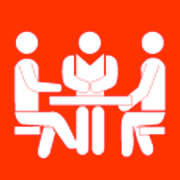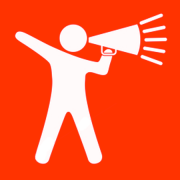Action Principles
Samu Social Senegal’s mission is to reach out in emergency to street children and to vulnerable children in the street. The following principles are implemented:
- in approaching children, considering them as victims who no longer have the strength or desire to turn to ordinary structures or any other association;
- moving children out of harm’s way in line with medico-psycho-social emergency procedures;
- facilitating the reinsertion of children through a network of institutional and private partners;
- supporting any action directly or indirectly connected to the issue of “vulnerable children”.
The Samu Social is the first link in a chain spanning from emergency to insertion. Its objective is to improve the situation of vulnerable street children and to avoid a worsening of their distress. We simply seek to implement a support process in the name of the dignity that every child, and generally, any person excluded from the standard support mechanisms, deserves.
The Street Rounds

Two Mobile Assistance Teams (MAT), made up of a social worker, who acts as team coordinator, a physician and a driver, tour the streets of Dakar 5 days a week, day and night, on-board an easily recognizable van, to identify children in a situation of family and/or social breakup in order to provide them with assistance and protection. The Samu Social Senegal mobile assistance teams are professional and multidisciplinary: there is a requirement for expertise linked to the complexity of the physical and rehabilitation process for street children.
They organize rounds (touring the streets in order to identify vulnerable children) and go into the territories of the children. They can also respond to a call by other actors who have identified children, but cannot take them in their care (associations, institutional structures, armed forces, individuals, etc.). Mobile teams can also respond to emergencies 24 hours a day anywhere in the Dakar area.
Through their action, they offer medical protection, nutritional assistance and psychosocial support to children exposed to the dangers of the street on a daily basis. Using their skills, they help children understand the events of the past, overcome the hardships of today and build projects for the future.
The MAT fulfil 4 main missions
Medical assistance
- On-the-spot primary treatment and medical monitoring care in the medical truck. Medical treatment is also considered a way of building a relationship of trust with the child (taking care of him) and of helping the child to regain self-confidence (taking care of himself).
- Referral towards ordinary health facilities (hospitals, infirmaries, etc.) for specific pathologies that do not require immediate treatment or a hospitalization.
- Transfer to a nursing bed at the Samu Social.
Psychosocial support
Doctors and social workers at Samu Social Senegal are trained on the psychopathological approach to children and adolescents based on three main skills:
- identifying particularly vulnerable children (psychopathological disorder symptoms),
- understanding implicit calls for help from the child’s language and behaviour,
- responding to these calls in a structured and constructive manner.
Preventive education
Mobile teams seek to develop preventive actions for this population which falls beyond standard programmes, due to its exclusion from the family, the school and the health system. A major theme is health education and STD-HIV/AIDS prevention in particular.
The teams also inform street children on the threats they might face on a daily basis: exploitation, namely commercial sexual exploitation, substance abuse and physical violence.
Paving a way out of the street
Samu Social Senegal provides various support services in order to rehabilitate street children and prepare them for reinsertion. Individual social interviews provide the information needed for social workers to better understand the situation of each child and help the latter look ahead to the future. Social workers encourage children and boost their willingness to leave the street when this wish has been expressed: they support the child’s project by working in partnership with structures that manage the return into the family or that are specialized in socio-professional reinsertion.
A few figures
- 350 street rounds per year
- close to 8000 children identified
- close to 6,000 nutritional support packs distributed every year
- more than 2500 individual interventions per year (medical treatment, social interviews)
Accomodation

Since July 2004, Samu Social Senegal has been based in the district of Ouakam, half-way between the city centre and the suburbs. CHUSIP stands for Emergency Shelter providing Nursing and Psychological Care.
The children sheltered and cared for in the centre are minors protected by the law. Thus in 2004 Samu Social Senegal signed an MOU with the Directorate for Supervised Education and Social Protection at the Justice Ministry, which states that our association is considered the legal guardian of sheltered children. Besides, an interim custody order is requested for each sheltered child and issued at a bi-monthly hearing by the President of the Youth Tribunal.
Sheltering vulnerable street children
The main function of the Samusocial centre is to provide shelter to street children in a state of physical and/or psychological vulnerability. These are namely:
- children whose health state does not require hospitalisation but sheltering for medical reasons;
- children victims of abuse;
- children in the process of being marginalised: children isolated from the group, children reduced to vagrancy;
- exhausted street children who can no longer recover vital patterns (wake/sleep, feeding), nor fulfil the activity/passivity dualism (activity becomes restlessness and passivity becomes lethargy);
- children in a state of regression
A place where children can find fundamental patterns and bearings

In so far as the centre welcomes vulnerable street children, its function is to help them recover, find their bearings and gather their strength. Because sheltered children have a traumatic relationship to their bodies and that of others (as a result of abuse and/or paradoxical overadaptation), it is important to give particular attention to moments for body rehabilitation.
Besides, the centre is a place which helps children recover their bearings, as the major pathology that street children suffer from is indifference, the feeling that all things are the same (day and night, life and death). The centre should be a place that helps rebuild the following bearings:
- spatial bearings: between the inside and the outside;
- temporal bearings: opening and closing moments;
- social bearings: allowed places and prohibited places;
- psycho-affective bearings: children should be able to leave the centre without being excluded, because in this way, they can experience the joy of returning to the centre, confident that they will be welcomed again (this experience can also better prepare them to envisage returning into their families).
The main activities of the Samu Social centre provide:
- medical care and treatment.
- social and psychotherapeutic interviews
- rehabilitation of the body based on four compulsory common moments: shower, meals, “soothing” and sleep.
- rehabilitation of the mind based on games and artistic activities in order to help children to psychologically depart from a street survival dynamic: for instance by structuring a space providing possibilities for looking at books, listening to music, drawing, painting, alone or as a group, with or without the help of an educator, but necessarily under the supervision/observation of an educator. Throughout the day and on weekends, children can take part in activities involving sports, learning, arts and play, as well as literacy. They can also join outings organized on a regular basis (hikes, beach, etc.).
Psychological support
A clinical psychologist has been running extremely beneficial psychosocial support and psychic rebuilding activities for children. Half a day is devoted to collective therapy when children discuss events of the week or share prior experiences (abandoned by their parents, lived in the daara, etc). The remainder of the time is dedicated to one-to-one interviews and to coordinating the teams on what must be done for each child. Samu Social Senegal is the only association enlisting the help of a clinical psychologist in the teams providing support to street children. Yet such psychological support is crucial, given the kind of trauma experienced by children before they end up and while they live on the streets. The psychologist namely helps children fulfil their desire to leave the street and supports the social coordinator in family mediation efforts. Furthermore, he leads weekly meetings at the centre when decisions are taken on each sheltered child, and provides technical support to the Samu Social Senegal teams. Indeed, the behaviour of the children can sometimes be confusing and our psychologist is precisely specialized in child psychopathologies.
Children and youths can feel extremely disturbed when they are sheltered because it represents a profound rift from the environment that they had learnt to exist in (the street): loss of bearings (spatial, human, temporal); new territory (the home = confined space); fixed hours and structured rhythm; permanent presence of adults; lack of drugs, alcohol; lack of physical violence.
Many children cannot stand this change and “choose” to go back to the street. Street children are caught up in constant swings back and forth between the street, the family, and shelters such as the Samusocial. When a child is sheltered at the Samusocial, the possibility of a return to the street must always be envisaged, and accepted. Such a return to the street, or going back and forth between the street, the centre and the family should never be considered as a failure on the part of the child, but rather, as various steps towards reconstruction.
A few figures
- the Chusip hosts 550 to 600 children annually on a boarding basis;
- annually : over 1500 psychosocial cares and about 7000 medical cares
- about 30,000 meals are served every year
Family Reunification
 Family reunification is not an end in itself. The first goal of the Samu Social Centre is to provide shelter to vulnerable children. It is only when the milestones are rebuilt that the child can envisage an exit from the street, and the Samu Social teams provide support in this respect, with sometimes several movements back and forth between the centre, the street and the family. Indeed, family reunification depends on the child’s willingness, in so far as without this acceptance, the support relationship, especially psychological support, is impossible. Our goal is not either to reunite the largest number of children with their families, but rather to ensure that these returns are long-lasting. This is why we mostly focus on the quality of the support and monitoring, not only of the children but also of the families. In the last few years therefore, we established a process to support street exit projects with social workers, psychologists, the creation in September 2010 of a Mobile Orientation Team (MOT) and the development of a network of resource persons in the main regions of Senegal. In the 12 months that follow the return into the family, close monitoring is performed, either by phone or through visits; over time, as the child becomes more stable, the visits are spaced out until they are no longer necessary. It is even desirable that after a period of time, the link is “severed” so that the situation goes back to normal.
Family reunification is not an end in itself. The first goal of the Samu Social Centre is to provide shelter to vulnerable children. It is only when the milestones are rebuilt that the child can envisage an exit from the street, and the Samu Social teams provide support in this respect, with sometimes several movements back and forth between the centre, the street and the family. Indeed, family reunification depends on the child’s willingness, in so far as without this acceptance, the support relationship, especially psychological support, is impossible. Our goal is not either to reunite the largest number of children with their families, but rather to ensure that these returns are long-lasting. This is why we mostly focus on the quality of the support and monitoring, not only of the children but also of the families. In the last few years therefore, we established a process to support street exit projects with social workers, psychologists, the creation in September 2010 of a Mobile Orientation Team (MOT) and the development of a network of resource persons in the main regions of Senegal. In the 12 months that follow the return into the family, close monitoring is performed, either by phone or through visits; over time, as the child becomes more stable, the visits are spaced out until they are no longer necessary. It is even desirable that after a period of time, the link is “severed” so that the situation goes back to normal.
There have been encouraging results over the last three years (2016-2018): out of 542 projects of family reunion, 521 were sustainable, which amounts to an 96,1% “success” rate over a three-year period. These figures are also revealing of the fact that the vast majority of the children we shelter come simply to decompress, take a break from the street, but they are not yet ready to envisage leaving the street. Thanks to the actions of Samusocial Senegal, about 1500 children overall have left the street in a durable manner since 2004.
Cross-cutting Activities
In order to monitor and professionalize the management of street children, Samu Social Senegal implements a number of activities in partnership with Samu Social International – ongoing or occasional – in order to build its technical skills and its level of understanding of the issue. Thus, core cross-cutting areas have been developed in the activities of Samusocial Senegal since its inception and on the basis of issues encountered.
Training and capacity building
 Samu Social Senegal organizes training seminars on the standard and pathological psychology of children and teenagers. Such training focuses on the clinical and psychopathological specificities shown by vulnerable children and teenagers living or seeking refuge on the street. It includes teaching on trauma, resilience methods and paradoxical overadaptation, and focuses on the relationship children have with language, others (peers and adults), time and space. The objective is to enable emergency professionals to better adapt their practices to this social and psychological context and to acquire assessment tools.
Samu Social Senegal organizes training seminars on the standard and pathological psychology of children and teenagers. Such training focuses on the clinical and psychopathological specificities shown by vulnerable children and teenagers living or seeking refuge on the street. It includes teaching on trauma, resilience methods and paradoxical overadaptation, and focuses on the relationship children have with language, others (peers and adults), time and space. The objective is to enable emergency professionals to better adapt their practices to this social and psychological context and to acquire assessment tools.
Samu Social Senegal also provides university education, especially at the National School of Specialized Social Workers (ENTSS) and training upon requests to institutional partners.
Research and advocacy

Improving the situation of street children also requires on the one hand to reduce the stigmatisation they experience, which leads to their rejection by the population, and on the other, better management of their specific situation by public authorities. This is why Samu Social Senegal implements activities that can intensify advocacy in favour of street children.
Field and outreach activities by Samu Social Senegal mobile support teams help to understand first hand the lives of the street children of Dakar, and to know their geographic origins, their history and their background. All the data collected during formal or informal exchanges between the children and the mobile support teams is input into an electronic database. In addition to helping with the individual monitoring of children, this database enhances sociological knowledge on the street children of Dakar and therefore helps to better understand the phenomenon, which is useful for both researchers and field actors.
Networking
One of the major areas of Samu Social interventions is the focus on developing partnerships, whether operational with other associations, or institutional with ministries and the City of Dakar. If the management of street children is a chain spanning from emergency to insertion, the work of Samusocial Senegal clearly lies with the first level of emergency, and sometimes post-emergency. Over time, we have developed a vibrant and dynamic network with numerous partners, each with an added value in the management of street children.



